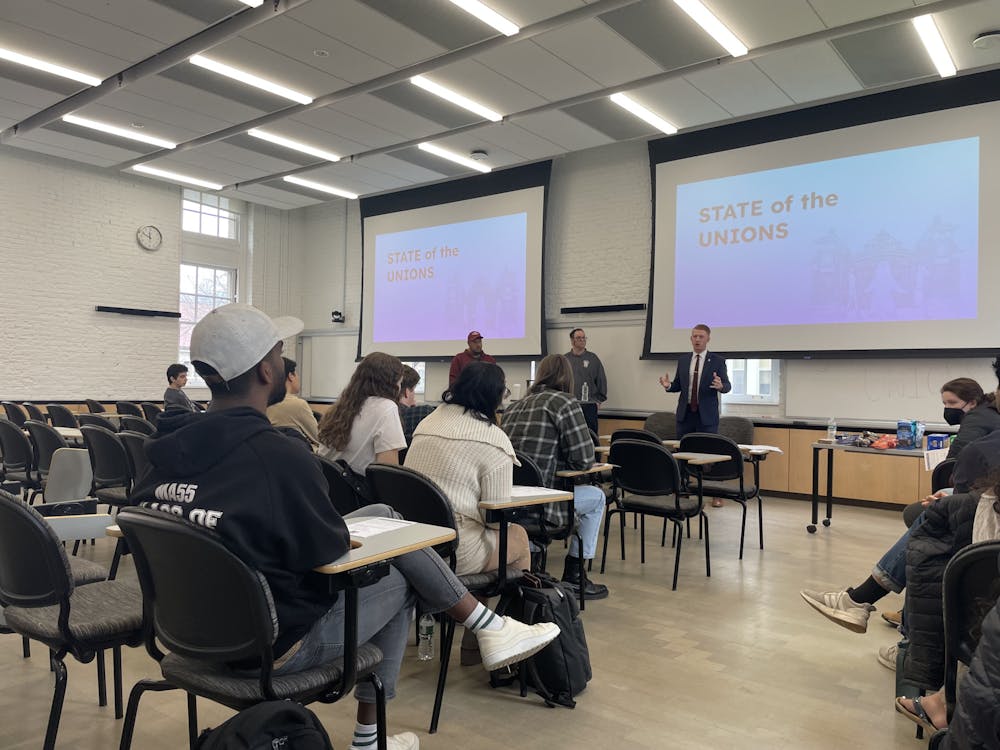Students, on-campus labor organizers and regional labor union representatives convened on Saturday for the Student Labor Alliance’s second annual State of the Unions meeting.
The event’s attendees heard presentations from student organizers with the Graduate Labor Organization, the Teaching Assistants Labor Organization — which represents Computer Science TAs — and the Third World Labor Organization, which represents student workers at the Brown Center for Students of Color.
The organizers reported on the status of each union’s bargaining and organizing activities since last year’s iteration of the event in January 2023. The event also featured UNITE HERE Local 26, which represents hospitality and food service workers in Boston and Providence, and Teamsters Local 251, which represents workers in transit, delivery and other industries in R.I. and parts of Massachusetts.
Teamsters Local 251 represents Rhode Island School of Design custodial staff, who ratified their first contract with RISD in April 2023, after a two-week-long strike, The Herald previously reported.
Local 251 also represents Brown, RISD and Rhode Island College shuttle drivers who work for Transdev, a third-party transportation company. The Transdev drivers voted to join the union in November and began negotiating their contract this spring, according to Local 251 Principal Officer Matthew Taibi.
Carlo Kim ’27, an SLA organizer, said that the event added important context to common beliefs about the changing role of labor unions over time.
“There is a perception of unions, especially nowadays, that they’re not really active entities — that they’re less than they were — and maybe to some macro extent, that’s true,” Kim told The Herald, adding that the event taught him that “at universities, at our university (and) everywhere unions are doing great work.”
“They’re getting real tangible change. They’re advocating for workers, they’re preventing repression, they’re making their voices heard,” Kim said.
Taibi underscored in a presentation to attendees the impact of student mobilization in support of RISD custodial workers’ contract negotiations. He suggested that similar support could aid Brown’s shuttle drivers as they continue bargaining with Transdev.
“It might be a situation here where, if Transdev wants to play hardball, we’ll be reaching back out” to students interested in supporting the cause, he said.
Michael Ziegler GS, GLO’s political director, attributed increases in his own salary to the union.
For Ziegler, the State of the Unions offered student labor organizations the opportunity to engage with unions beyond campus. “It’s good to have regional labor represented because it’s important to remember that we are all working within a city that’s very interconnected,” he told The Herald.
Ziegler also suggested in his presentation that all labor organizations on Brown’s campus attempt to align contract cycles ahead of GLO’s next negotiations in 2026.
“I’m hoping we'll be able to coordinate such that we’re all bargaining at the same time in spring 2026, hopefully really forcing a crisis on leadership,” he said, adding that student labor organizers should push for “getting organized labor a seat on the Corporation … a seat at the table when those decisions are being made.”
TALO representatives described increased interest in on-campus labor organizing after the University raised the wage floor for all undergraduate TAs in September 2023. This increase was largely a product of TALO’s early organizing efforts, said Swetabh Changkakoti ’24, former director of technology for The Herald, who sits on the organization’s bargaining committee.
For the past year, the union has focused on building “internal structures” and developing a constitution that preserves the institution’s organizing capability in spite of high membership turnover each semester, he added.
TWLO, Brown’s newest on-campus labor organization, hopes to begin negotiations with the University in the near future, according to an organization representative. They also shared that a clearer picture of the organization’s bargaining goals would emerge after its first general body meeting, which took place on Saturday afternoon.
For Kim, the State of the Unions represented not only a chance to learn about on-campus labor activities but was an opportunity for coalition-building among unions, he said in an interview with The Herald.
“I see some of our own student organizers connecting with these more experienced or seasoned union people, and I really hope that they learned something,” Kim added.
Ethan Schenker is a university news editor covering staff and student labor. He is from Bethesda, MD, and plans to study International and Public Affairs and Economics. In his free time, he enjoys playing piano and clicking on New York Times notifications.





